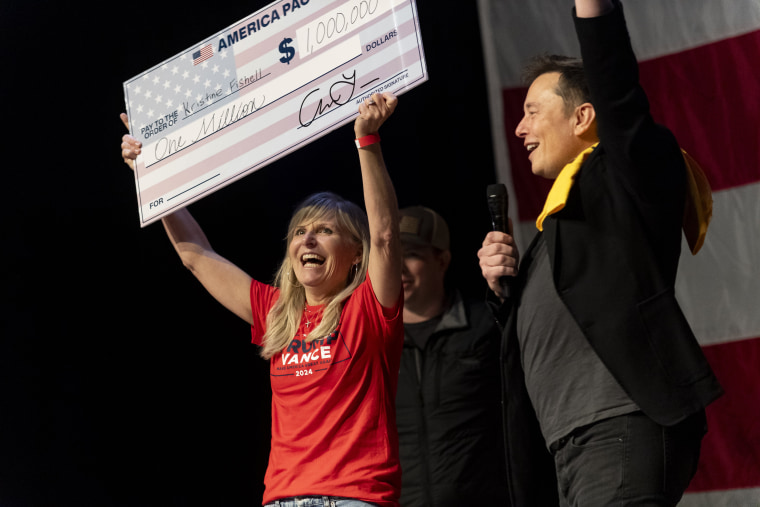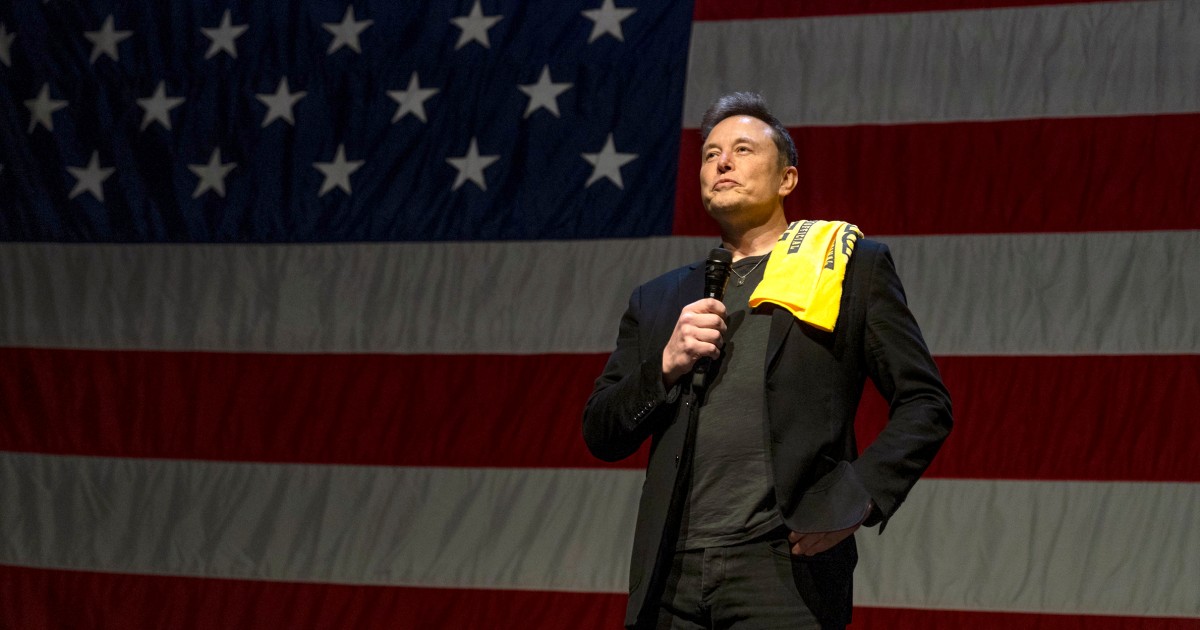Elon Musk’s daily $1 million lottery for registered swing state voters who sign his Super PAC’s political petition falls into a legal gray area and could potentially violate election law, three experts told NBC News.
The petition, created by Musk’s America Political Action Committee, comes amid his larger campaign over the last week to register conservative voters in swing states.
Paying someone to vote or to register to vote is explicitly illegal under federal law. Musk’s payouts seem to skirt those laws, though. Musk and America PAC have said that payouts or lottery entries will be given to registered voters for their petition signatures or referrals of other signatories. The petition is supportive of free speech and gun rights. Signing the petition does not require any specific party affiliation.
“I think it straddles the line, and it’s a little unclear whether it goes over the line or not,” said John Fortier, a senior fellow at the American Enterprise Institute who specializes in election administration.
The fact that the lottery is contingent on signing a petition, rather than merely registering to vote, may be enough to keep Musk from overtly breaking the law, experts told NBC News, but it’s not clear cut.
“This is at best very questionable legally,” said Michael Morse, an assistant professor of law at the University of Pennsylvania Carey Law School, said. “Federal law says that you cannot pay someone to register to vote. I think you can read this petition as an inducement to register to vote.”

“I’ve never heard of a million-dollar lottery in the last weeks of a presidential campaign, to either sign a petition or to induce people to register, so we’re in new legal territory here,” said Nate Persily, a professor at Stanford Law School.
“The relevant legal question is whether this is payment to induce people to register. If it is, then it violates the law. If it’s payment to induce people to sign a petition, then it’s not a problem,” he said.
Musk’s PAC announced the initial payouts to signatories and referrers of signatories of the petition on Oct. 6. Over the last several days, Musk has upped the ante, adding money to his promises several times.
Rick Hasen, the director of the UCLA School of Law’s Safeguarding Democracy Project and an NBC News election law analyst, wrote Saturday that he believes Musk’s plan is “clearly illegal” because the petition requires signers to be registered voters in particular states.
Hasen noted that the Justice Department’s Election Crimes Manual explicitly cites “lottery chances” as an example of a type of illegal bribe if it’s “intended to induce or reward the voter for engaging in one or more acts necessary to cast a ballot.”
Pennsylvania’s governor, Democrat Josh Shapiro, said on Meet the Press Sunday that the lottery was “deeply concerning” and suggested law enforcement could investigate it.
But none of the experts who spoke with NBC News believed law enforcement is likely to stop the lottery or fine Musk before the election.
“The Department of Justice is authorized to enforce the statute, Morse said. “But I think in the next three weeks, they have other things to do.”
The Justice Department, Pennsylvania Attorney General’s office, and Federal Election Commission all declined to comment.
Musk endorsed Trump in July, after Trump became the Republican Party’s nominee. The world’s wealthiest person, Musk has engaged in at least 11 regulatory or legal battles with the federal government related to his companies, a previous NBC News tally found, making the stakes of the presidential election high for him. Musk’s companies have won billions in federal contracts over the last decade, according to a recent tally from the New York Times.
The deadline for voter registration in Pennsylvania and Michigan is Monday. The contest’s rules appear to say that while it no longer accepts new entrants after Monday, it will continue to name new $1 million prize winners each day until the election. So far it has named two.
On Monday morning, Musk celebrated Republican voter registration in Pennsylvania..
“New Republican voter registration last week in Pennsylvania absolutely crushed Democrat voter registration!” he wrote on X.
Morse, the Penn law professor, said he viewed the lottery as unlikely to be a consequential stunt, and instead it seemed more like a data mining operation.
“You can only register to vote in Pennsylvania until today. I just see this as a political stunt. It’s a stunt to mine people’s data, to build up an email list for contacts, for campaigning, for mobilization,” he said, referring to get-out-the-vote efforts and other voter engagement.

Leave a Reply